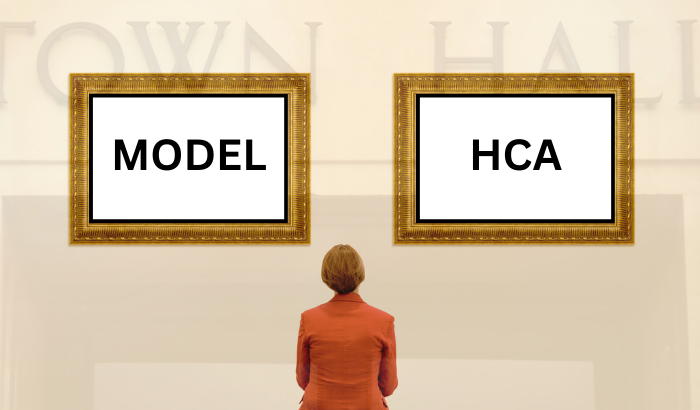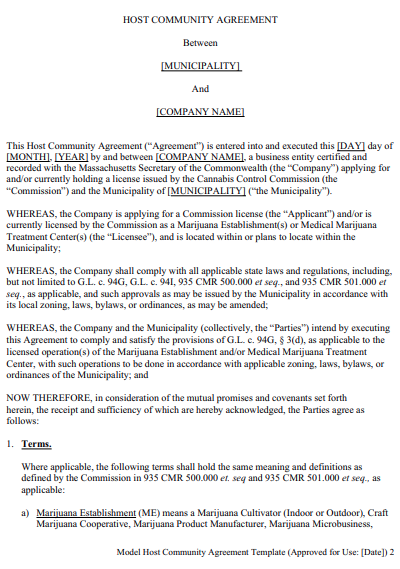
“We did a lot of reviews of HCAs that are out in the industry and that have been used—whether you would call them good HCAs, or bad HCAs, or indifferent HCAs, we read a lot of them.”
In 2022, Massachusetts lawmakers passed An Act Relative to Equity in the Cannabis Industry, essentially to correct several unforeseen problems created by the state’s dated original regulations.
Roughly one year later, the Cannabis Control Commission completed the complicated process of rewriting some rules as required by the new law, also known as Chapter 180.
Among the changes, state regulators rewrote regulations around Host Community Agreements (HCAs). For years, companies have complained of abuse and even extortion at the hands of city hall, but now adjustments have been put in place to prevent towns from taking advantage of cannabis businesses in their fiefdoms.
Increasingly, relationships between a number of retailers and their host communities have turned sour, resulting in threats of lawsuits and even actual litigation. As one measure to simplify things and intentionally ease negotiations between businesses and towns, the agency has taken on the challenge of authoring a model Host Community Agreement that any applicant can adopt, sort of like a common app you can use to apply to multiple colleges at once.
“This is a project based on the discussions … during the regulatory process,” CCC Licensing Director Kyle Potvin said at the commission’s Thursday meeting. “The commission put it in its regulations that it wanted to have a model HCA available to the public.”
The process has taken six months so far. Meanwhile, industry attorneys are watching the updates closely. As are municipal stakeholders. Among other measures, Potvin said, “We did a lot of reviews of HCAs that are out in the industry and that have been used—whether you would call them good HCAs, or bad HCAs, or indifferent HCAs, we read a lot of them.”
The licensing director added, “This is a contract, and if you get two parties in the room, getting to an agreement is not always the easiest thing in the world. So trying to draft what is the ideal agreement that we want people to use is even more difficult because we’re trying to look from different perspectives.”
They aimed for simplicity, a “fill-in-the-blank document for anybody to use.”
“We want this document to be used and utilized, we want it to be functional,” Potvin said. “If you had no access to attorneys, if you had no access to capital, and if you wanted to go to a municipality and say, Here is the agreement, it’s already done, I signed it, can you sign it back, we wanted to give that opportunity, especially to those who have not had traditional access to resources as others have.”
Potvin specified: “It’s not mandatory or something that the parties have to use,” and it’s also “not legal advice.”
On March 1, Potvin noted, “the commission staff are going to start asking for and reviewing and certifying or sending notices of deficiency or request for information on HCAs. So if you are a licensed applicant and you press the submit button, we are now going to ask for an HCA. If you’re a licensee and you’re applying for a renewal and you hit that button at any point after March 1st, we are going to ask for a compliant HCA or an HCA waiver, because that is an option as well.”
In reviewing the model HCA provided in the Thursday meeting materials, Commissioner Kimberly Roy noted that the document could also potentially be used for social consumption applications once that program is set up.
“I know we don’t have the framework,” Roy said, “but do we put something in [regarding social consumption] and that way we don’t have to go back and ratify?”
Potvin said that was an oversight, and is something his department will consider as they finalize a model HCA to be voted on at next month’s meeting. The eight-page contract is still being processed by various CCC departments, while members are also giving the public an opportunity to review and communicate any concerns to them over the next two weeks.
Asked about potential pushback, Potvin said, “All of our legacy licenses and municipalities out there that have current HCAs, speaking anecdotally, there’s definitely going to be a population that will not comply with these new promulgated regulations in some way, shape, or form.” In those cases, he explained, “There is built into our compliance equitable relief options, but this model HCA can also serve as a viable option for those constituencies—as an interim agreement that would basically supplant the previous contract. It would be short-term, or based on whatever duration the parties want to do … it could be used to get the municipality and the licensee to compliance.”
In that kind of stalemate, for example if a town is trying to force out a dispensary it dislikes by refusing to communicate with a business, that business can get approved for its state license by the CCC, then go back and re-negotiate a new amended HCA with their host community.
At a press availability after Thursday’s commission meeting, Acting CCC Chair Ava Callender Concepcion said that while she is aware of pending lawsuits related to HCAs, she is confident that the Chapter 180 rewriting process was transparent, and that the model HCA among other steps taken should make for more peaceable agreements moving forward.
“At this point, I don’t expect a lot of pushback,” Concepcion said, “because everyone knew that it was coming.”


























